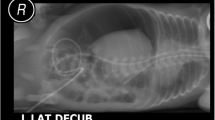Abstract
To identify intestinal complications during the neonatal period following spontaneous isolated intestinal perforation (SIP). A retrospective case notes review was undertaken of all patients with a diagnosis of SIP, confirmed at laparotomy or post-mortem, admitted between January 2000 and January 2005. Patients with confirmed gastric perforation were excluded as were patients with proven necrotising enterocolitis (NEC) or suspected, but not confirmed, SIP. Seventeen patients, median gestation 27 weeks and median birth weight 780 g, were treated by drain alone (1), drain and later laparotomy (4) or primary laparotomy (12). Eight patients required enterostomy formation at primary laparotomy (1 jejunostomy, 1 colostomy and 6 ileostomy). Five babies died in the neonatal period and three later in the first year. Nine patients (53%) had ten subsequent episodes of intestinal pathology requiring surgical intervention between 5 and 136 days later comprising early recurrent isolated perforation (2), NEC (3), milk curd obstruction with or without perforation (3) and adhesion obstruction (2). Secondary surgery involved laparotomy in eight patients, five of whom required formation or re-formation of a stoma, and palliative drain insertion in one patient. Recurrent intestinal pathology requiring surgical intervention during the neonatal period occurred in 53% of babies with SIP. Surgeons and neonatologists should be aware that this group of patients are prone to further intestinal pathology.
Similar content being viewed by others
References
Buchheit JQ, Stewart DL (1994) Clinical comparison of localized intestinal perforation and necrotizing enterocolitis in neonates. Pediatrics 93(1):32–36
Holland AJ, Shun A, Martin HC, et al (2003) Small bowel perforation in the premature neonate: congenital or acquired? Pediatr Surg Int 19(6):489–494
Pumberger W, Mayr M, Kohlhauser C, et al (2002) Spontaneous localized intestinal perforation in very-low-birth-weight infants: a distinct clinical entity different from necrotizing enterocolitis. J Am Coll Surg 195(6):796–803
Uceda JE, Laos CA, Kolni HW, et al (1995) Intestinal perforations in infants with a very low birth weight: a disease of increasing survival? J Pediatr Surg 30(9):1314–1316
Boston VE (2006) Necrotising enterocolitis and localised intestinal perforation: different diseases or ends of a spectrum of pathology. Pediatr Surg Int 22(6):477–484
Hutson JM (2004) An epidemic of isolated perforation: how can we stop it? Pediatr Surg Int 20(2):75–76
Adderson EE, Pappin A, Pavia AT (1998) Spontaneous intestinal perforation in premature infants: a distinct clinical entity associated with systemic candidiasis. J Pediatr Surg 33:1463–1467
Mintz AC, Applebaum H (1993) Focal gastrointestinal perforations not associated with necrotizing enterocolitis in very low birth weight neonates. J Pediatr Surg 28(6):857–860
Novack CM, Waffarn F, Sills JH, et al (1994) Focal intestinal perforation in the extremely-low-birth-weight infant. J Perinatol 14(6):450–453
Izraeli S, Freud E, Mor C, et al (1992) Neonatal intestinal perforation due to congenital defects in the intestinal muscularis. Eur J Pediatr 151(4):300–303
Litwin A, Avidor I, Schujman E, et al (1984) Neonatal intestinal perforation caused by congenital defects of the intestinal musculature. Am J Clin Pathol 81(1):77–80
Skov BG, Kofoed PE, Nielsen B (1986) Gastrointestinal perforation due to congenital absence of intestinal musculature. A case report. Acta Chir Scand 152:779–780
Wurtzel D, Nicosia RF, Yoskovitch A, et al (1996) Neonatal intestinal perforation caused by intestinal muscularis defect associated with vascular ectasia. J Matern Fetal Med 5(1):18–21
Fejgin MD, Delpino ML, Bidiwala KS (1994) Isolated small bowel perforation following intrauterine treatment with indomethacin. Am J Perinatol 11(4):295–296
Shorter NA, Liu JY, Mooney DP, et al (1999) Indomethacin-associated bowel perforations: a study of possible risk factors. J Pediatr Surg 34:442–444
Wolf WM, Snover DC, Leonard AS (1989) Localized intestinal perforation following intravenous indomethacin in premature infants. J Pediatr Surg 24(4):409–410
Yadav K, Rao JP (1980) Small bowel perforation in a neonate due to staphylococcal septicemia. Indian J Pediatr 47(385):169–170
Zamir O, Goldberg M, Udassin R, et al (1988) Idiopathic gastrointestinal perforation in the neonate. J Pediatr Surg 23(4):335–337
Huang SF, Vacanti J, Kozakewich H (1996) Segmental defect of the intestinal musculature of a newborn: evidence of acquired pathogenesis. J Pediatr Surg 31(5):721–725
Tatekawa Y, Muraji T, Imai Y, et al (1999) The mechanism of focal intestinal perforations in neonates with low birth weight. Pediatr Surg Int 15:549–552
De Laet MH, Dassonville M, Johansson A, et al (2000) Small-bowel perforation in very low birth weight neonates treated with high-dose dexamethasone. Eur J Pediatr Surg 10(5):323–327
Ng PC, Fok TF, So KW, et al (1997) Lower gastrointestinal tract perforation in preterm infants treated with dexamethasone for bronchopulmonary dysplasia. Pediatr Surg Int 12(2–3):211–212
Girisch M, Ries M, Zenker M, et al (2003) Intestinal perforations in a premature infant caused by Bacillus cereus. Infection 31(3):192–193
Lessin MS, Luks FI, Wesselhoeft CW Jr, et al (1998) Peritoneal drainage as definitive treatment for intestinal perforation in infants with extremely low birth weight (<750 g). J Pediatr Surg 33:370–372
Cass DL, Brandt ML, Patel DL, et al (2000) Peritoneal drainage as definitive treatment for neonates with isolated intestinal perforation. J Pediatr Surg 35(11):1531–1536
Michel JL, Harper L, Alessandri JL, et al (2004) Peritoneal needle suction for intestinal perforation in the preterm neonate. Eur J Pediatr Surg 14(2):85–88
Rovin JD, Rodgers BM, Burns RC, et al (1999) The role of peritoneal drainage for intestinal perforation in infants with and without necrotizing enterocolitis. J Pediatr Surg 34:143–147
Resch B, Mayr J, Kuttnig-Haim M, et al (1998) Spontaneous gastrointestinal perforation in very-low-birth-weight infants–a rare complication in a neonatal intensive care unit. Pediatr Surg Int 13(2–3):165–167
Moss RL, Dimmett RA, Barnhart DC, et al (2006) Laparotomy versus peritoneal drainage for necrotizing enterocolitis and perforation. NEJM 354:2225–2234
Author information
Authors and Affiliations
Corresponding author
Rights and permissions
About this article
Cite this article
Drewett, M.S., Burge, D.M. Recurrent neonatal gastro-intestinal problems after spontaneous intestinal perforation. Pediatr Surg Int 23, 1081–1084 (2007). https://doi.org/10.1007/s00383-007-1999-2
Accepted:
Published:
Issue Date:
DOI: https://doi.org/10.1007/s00383-007-1999-2




